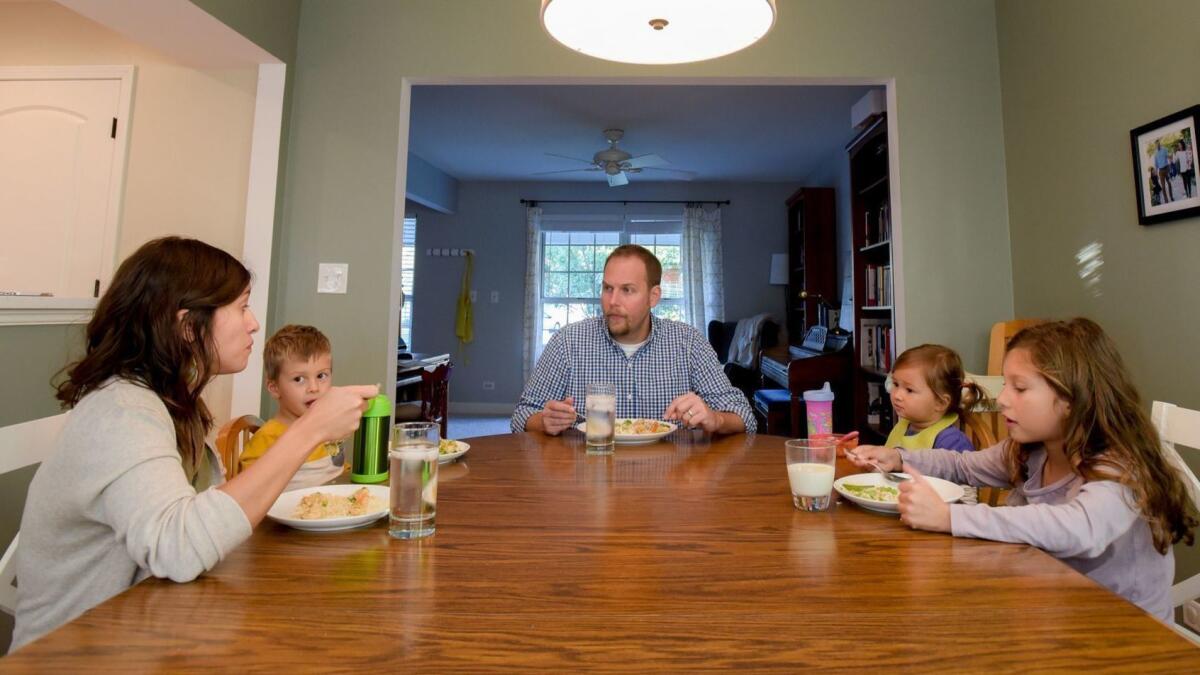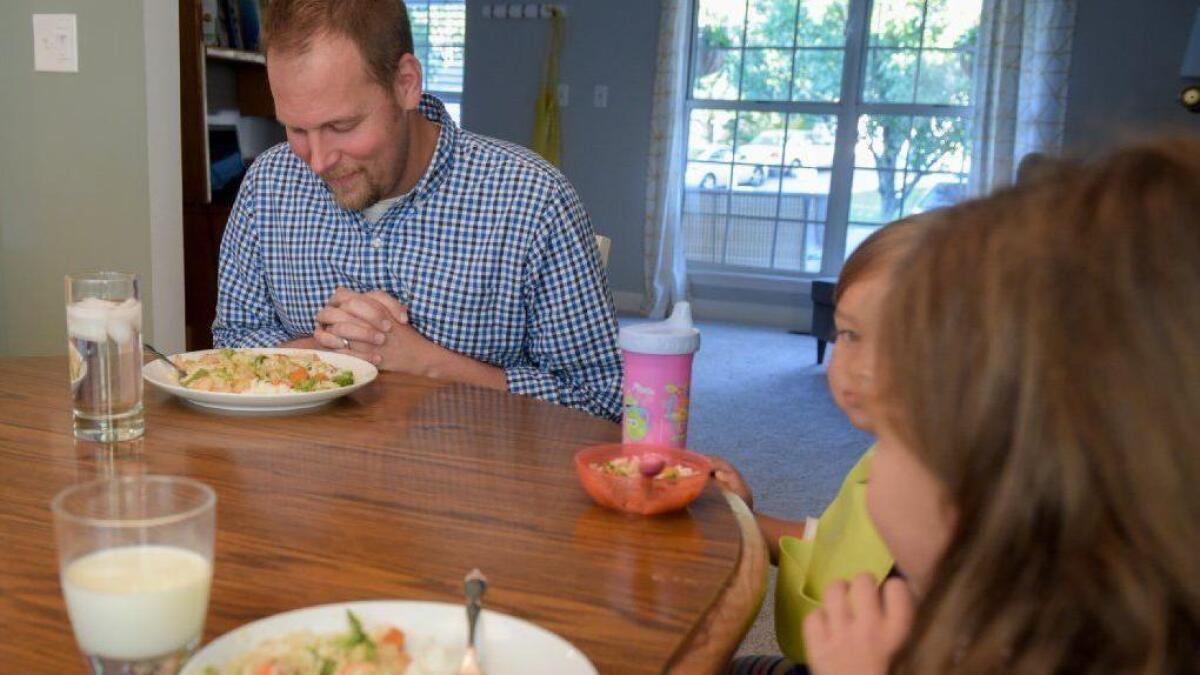Frustrated with health insurance costs, some turn to religious plans instead

- Share via
Sarah Barazza doesn’t have health insurance, but money was the last thing on her mind as she and her 15-month-old son raced to the hospital in an ambulance last year. The toddler’s airway had become swollen from croup, and he struggled to breathe.
“Wow, I’m so grateful I don’t have to worry about finances,” the Plainfield, Ill., woman said. “I’m just focused on taking care of my child.”
Her son Moises recovered. The family’s out-of-pocket cost for the episode: nothing.
The Barazza family belongs to a healthcare sharing ministry, a religious nonprofit in which members pay for one another’s healthcare needs. Ministries’ monthly member costs are often much lower than traditional health insurance premiums. But unlike traditional insurance, members must often commit to religious principles. The ministries generally won’t pay for services that don’t align with those principles, such as abortion and substance abuse treatment, and they often limit coverage of preexisting conditions and prescriptions.
Despite those differences, some Americans — including tens of thousands in California — are turning to the ministries amid frustrations over the costs of traditional health insurance and the Affordable Care Act’s mandate that everyone buy insurance or pay a penalty. Ministry members are exempt from that mandate, which will end after this year.
The ministries are another way many people are thinking outside the box, trying to find ways to pay for their healthcare needs without spending sometimes large amounts on health insurance.
It’s hard to say exactly how many people take part in the ministries, but the Internal Revenue Service estimates that in 2016, more than 330,000 people claimed exemptions to the health insurance mandate because they were members of a healthcare sharing ministry.
[Healthcare sharing ministries are] not insurance. There’s no contract.... They either will or won’t send money.
— Karen Pollitz, senior fellow with the Kaiser Family Foundation
More than 20,000 people in California are members of three of the larger Christian ministries, some of which have been around for decades.
But experts, and the ministries themselves, caution that they’re not the same as health insurance and they’re not right for everyone. No one regulates healthcare sharing ministries, and they’re not subject to the same standards and requirements as health insurance, such as those meant to ensure prompt payments and financial solvency.
“They’re not insurance,” said Karen Pollitz, a senior fellow with the Kaiser Family Foundation. “There’s no contract. This is just a group of people who say God wants us to pay for each other’s medical bills, and then they either will or won’t send money.”
The uncertainty isn’t stopping people from choosing ministries over traditional health insurance.
Michael and Sarah Johnson of Carol Stream, Ill., joined Samaritan Ministries about five years ago after Michael decided to go back to school to become a pastor, at which point he no longer could get insurance through an employer. Joining Samaritan was cheaper than buying health insurance, enabling the couple to save for a down payment on a house and not go further into debt.
They pay a little more than $500 a month for Samaritan. That money goes straight to other members most months, with Samaritan telling the Johnsons where to send their checks.

When it comes to their own medical needs, the Johnsons generally pay for services and incidents that cost less than $300 out of pocket. Samaritan also doesn’t cover their preventive care. But as relatively healthy people in their 30s, they estimate they’re saving thousands of dollars a year over what it would cost to pay for traditional plans’ premiums and deductibles.
“At first, you think, ‘Is this really going to work? Will people actually send us money, or are we going to be left high and dry?’” Sarah said.
So far, it has worked. When Sarah gave birth to the couple’s second child in 2014, Samaritan members sent them about $18,000 to pay for the cesarean birth, the cost after discounts from providers. Many of the checks, from Samaritan members across the country, came with prayers and notes with well wishes.
Samaritan’s religious foundations also appeal to the couple. Like other members, when they joined, they had to sign documents agreeing not to smoke, drink excessively or use drugs. They also had to promise to go to church regularly and be faithful in their marriage. Their pastor had to affirm to the ministry that they were active in their faith community.
“With Samaritan, we’re not supporting things we have a moral objection to,” Michael said.
Samaritan, based in Peoria, Ill., has about 80,000 member families nationwide, including more than 3,800 families in California. Members often get “self-pay” discounts that doctors offer to people who don’t have insurance.
Other large ministries operate similarly, though each has its own rules and payment structures. Some ministries have networks of doctors so patients can get discounts on services.
Another ministry, Florida-based Medi-Share, asks members to pay an “annual household portion” of their medical expenses before kicking in money — similar to a deductible in traditional insurance. That portion can range from $1,000 to $10,500, depending on how much members contribute, or share with others, each month.
Another large ministry, Liberty HealthShare, has about 98,000 families across the country, including about 6,000 households in California. Members pay $199 to $579 a month, depending on which program they choose and their age and family size. They pay $2,250 a year for medical expenses before Liberty members will start sharing costs.
Unlike some ministries, Liberty, which is affiliated with the Mennonite faith, doesn’t require members to be part of a church community or even be Christian. Members are, however, asked to agree to a set of shared Christian beliefs, including that everyone has a “right to worship the God of the Bible in his or her own way” and that “it is our spiritual duty to God and our ethical duty to others to maintain a healthy lifestyle,” among other points.
“It really arises out of the Mennonite belief system and worldview that essentially believes we’re called to assist others who are in need without necessarily confinement or restriction as to who that aid or assistance goes to,” said Dale Bellis, founder and chairman of Liberty, based in Canton, Ohio.
“We’ve abandoned the health insurance model and instead rely on each other to pay our bills,” Bellis said.
The Affordable Care Act, also known as Obamacare, generally prohibits insurers from denying coverage for preexisting conditions and from limiting how much they will put toward a patient’s medical expenses. The law also requires insurance companies selling plans to individuals to pay for things such as prescription drugs and mental health care.
Healthcare sharing ministries face none of those requirements — and many don’t meet them.
Medi-Share members, for example, generally won’t get help with prescription drug costs for more than six months. “It’s not the best fit for everyone,” said Michael Gardner, a spokesman for Medi-Share. “[For] someone who has really high recurring monthly prescription costs, it’s probably not going to be the most affordable.”
Ministries technically have no legal obligation to pay for members’ health costs, said Pollitz, with the Kaiser Family Foundation.
Samaritan spokesman Anthony Hopp acknowledged that some months, there’s not quite enough money to pay for everyone’s medical needs, though that’s not the case the majority of the time. During those months, members may get 80% or 90% of their bills covered.
When that happens, Samaritan typically will make it up through an overage the next month, extra giving from members or discounts from providers. If it happens three months in a row, members can vote to raise the monthly share fee. The last increase was more than two years ago.
Conversely, some months there’s more money than needed, and when that happens, members don’t have to pay as much those particular months, he said.
It’s also uncertain whether the ministries will continue to attract as many people. After this year, the Affordable Care Act penalty for failing to buy insurance will disappear.
The ministries have “been growing more rapidly ever since the huge premium inflation in the individual market triggered by Obamacare,” said Dr. David Weldon, president of the Alliance of Health Care Sharing Ministries.
Premiums on health insurance plans sold through Covered California — the state’s Affordable Care Act exchange — have been climbing, with double-digit increases this year and last year and a rise of nearly 9% next year.
Bellis, founder and chairman of Liberty, expects that the penalty’s absence will have a minimal effect. Liberty estimates less than 5% of its members joined because of the law’s requirement to buy insurance or face a penalty.
Ministry member Nancy Hill of Gurnee, Ill., plans to continue her membership, even without the penalty. Hill and her husband were members of Land of Lincoln before the insurance company shut down in mid-2016. They looked into joining Blue Cross and Blue Shield of Illinois but estimated they would have had to pay about $1,500 a month in premiums and still wouldn’t have been able to see their preferred doctors.
They became members of Christian Healthcare Ministries and now pay about $300 a month, plus an additional couple hundred dollars a year to avoid a cap on their coverage per illness. They are also members of a separate, direct primary care practice, paying a monthly fee for unlimited doctor appointments.
As relatively healthy people, they have yet to file a claim. But Hill said they’ll continue participating in the ministry in case of an unexpected, serious medical need.
“We’re saving thousands of dollars,” Hill said. “I don’t think this kind of program is for everyone, but for us it’s been a godsend.”
Schencker writes for the Chicago Tribune. Times staff writer Aurora Percannella contributed to this report.
More to Read
Inside the business of entertainment
The Wide Shot brings you news, analysis and insights on everything from streaming wars to production — and what it all means for the future.
You may occasionally receive promotional content from the Los Angeles Times.










